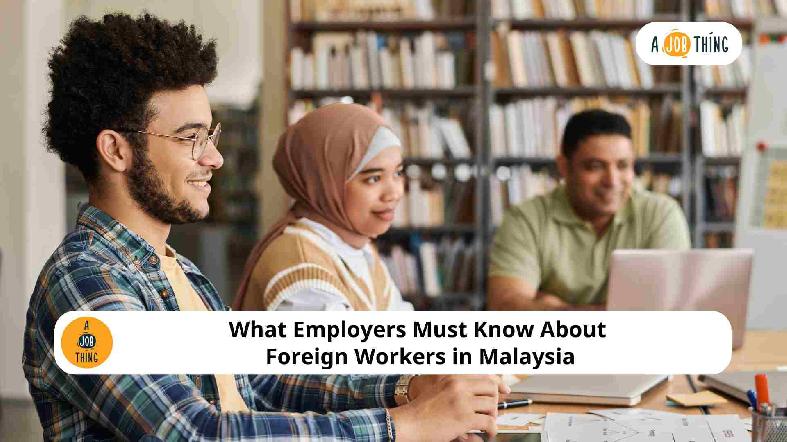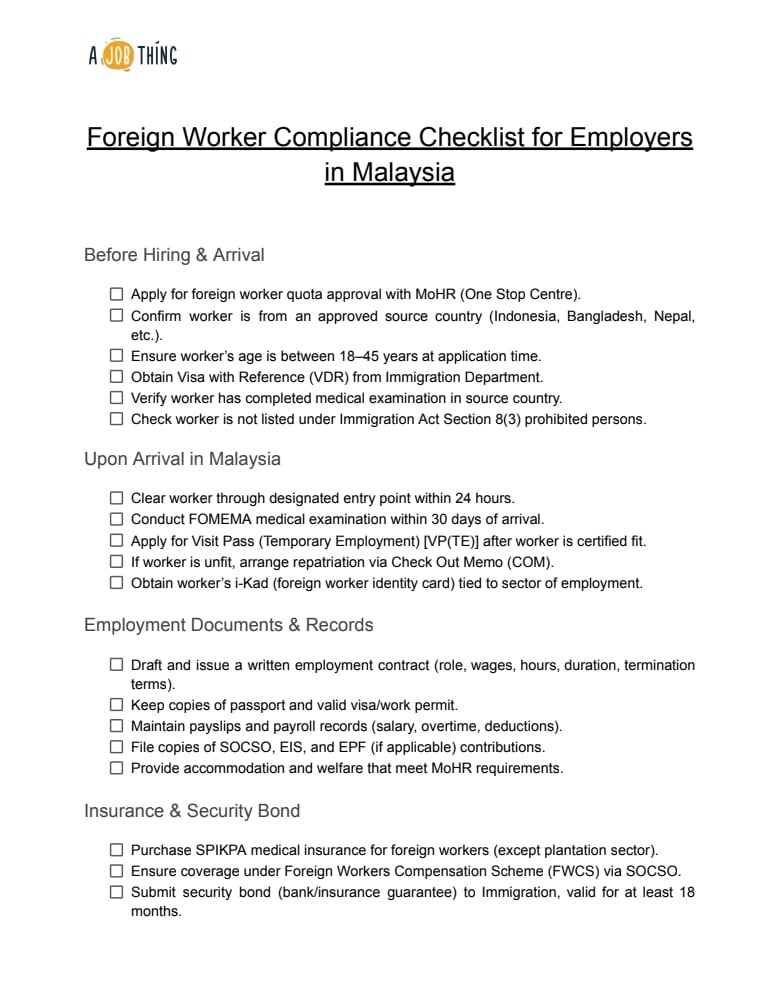
Hiring Foreign Workers in Malaysia: Regulations, Permits, and More
Are You Hiring?
Find candidates in 72 Hours with 5+ million talents in Maukerja Malaysia & Ricebowl using Job Ads.
Hire NowMany Malaysian businesses rely on foreign workers to keep operations running smoothly. However, the rules for hiring them are far more complex than for local employees. Employers must handle permits, medical checks, insurance, payroll, and repatriation responsibly. Done right, this ensures compliance and avoids penalties.
What is a Foreign Worker in Malaysia?
Under Malaysian law, a foreign worker refers to any employee holding a foreign nationality who is employed in the country with valid approval from the Immigration Department. Foreign workers are subject to strict regulations regarding entry, permits, and employment terms.
They are generally classified into categories such as unskilled, semi-skilled, skilled workers, and expatriates. Unlike expatriates, who are often employed for specialised or high-level roles, foreign workers usually fill labour shortages in sectors such as manufacturing, construction, plantations, agriculture, and services.
Employers must manage foreign workers carefully because non-compliance with immigration or labour laws can lead to severe consequences such as fines, deportation of workers, or even blacklisting of the company.
Who Counts as a Foreign Worker in Malaysia?
A foreign worker is any non-Malaysian citizen legally employed under a work permit or temporary employment pass.
Types of foreign workers include:
-
Unskilled and semi-skilled workers: Often employed in plantations, construction, and manufacturing.
-
Skilled workers: Employees with specialised knowledge, usually in technical or service-based roles.
-
Expatriates: Professionals hired for senior management or highly specialised skills.
Industries that commonly hire foreign workers include manufacturing, construction, agriculture, plantations, and services, which face persistent local labour shortages.
Why Do Employers Hire Foreign Workers?
Employers often rely on foreign workers for several reasons:
-
Labour shortages: Certain industries face difficulty attracting local employees, especially in physically demanding jobs.
-
Cost considerations: Hiring foreign workers can be more cost-effective in some sectors.
-
Seasonal or temporary needs: Industries such as plantations or construction may require workers during peak seasons.
-
Skill gaps: Foreign workers may provide specific skills not readily available in the local workforce.
Documents Employers Must Prepare for Foreign Workers
To remain compliant, employers must prepare and maintain the following documents:
Work Permit Application & Approval
Employers must obtain approval from the Immigration Department, typically through the Foreign Workers Centralized Management System (FWCMS). Applications are subject to quota approvals from the Ministry of Human Resources (MoHR).
Employment Contract
Every foreign worker must have a written contract that specifies the job role, wages, working hours, and employment duration. Contracts must comply with the Employment Act 1955 and other relevant laws.
Passport & Visa Copies
Employers must keep copies of valid passports and entry visas or work permits for all foreign workers.
Medical Examination & Health Reports
Workers must undergo medical examinations through FOMEMA within 30 days of arrival in Malaysia. Only those certified fit can continue employment. Employers must repatriate workers who fail medical checks using a Check Out Memo (COM).
Insurance & Security Bond Documents
Employers are required to:
-
Purchase Foreign Worker Hospitalisation and Surgical Insurance (SPIKPA) and other coverage as required.
-
Provide a security bond (bank guarantee/insurance guarantee) to the Immigration Department. The bond amount varies by nationality.
Renewal & Record-Keeping Documents
Employers must ensure the timely renewal of work permits (Visit Pass Temporary Employment, VP(TE)), payroll records, and statutory contributions such as SOCSO and EIS, where applicable.
How to Apply for Foreign Worker Recruitment
The process typically involves two phases:
Phase 1: Before Arrival
-
Apply for quota approval through the MoHR.
-
Obtain a Visa with Reference (VDR) from the Immigration Department.
-
Ensure the worker enters Malaysia through designated entry points.
-
Conduct medical checks in the source country to certify the worker’s health.
Phase 2: After Arrival
-
Clear immigration formalities within 24 hours of arrival.
-
Conduct a FOMEMA medical examination within 30 days.
-
Once certified fit, apply for and obtain the Visit Pass (Temporary Employment, VP(TE)).
-
If unfit, repatriate the worker immediately with a Check Out Memo (COM).
Employer Obligations When Hiring Foreign Workers
Employers have several ongoing obligations, including:
-
Pay wages on time and in accordance with the Employment Act.
-
Provide benefits and statutory contributions (SOCSO, EIS, EPF if applicable).
-
Ensure medical check-ups and maintain valid insurance coverage (SPIKPA and FWCS).
-
Provide proper accommodation and welfare in line with MoHR regulations.
-
Keep updated and accurate records of employment, contracts, and contributions.
Foreign Worker Permit Renewal and Repatriation
Employers must stay on top of renewal and repatriation duties, as both are critical to remaining compliant.
Permit Renewal
The Visit Pass (Temporary Employment), or VP(TE), is valid for 12 months and can usually be renewed up to a maximum of 10 years, depending on the sector. Renewal should be initiated at least three months before expiry to avoid enforcement action.
Employers must also ensure workers undergo follow-up medical examinations with FOMEMA during the second and third year of renewal. Submitting late renewal applications risks penalties, enforcement investigations, or even rejection.
Repatriation
Once a worker’s contract ends, the employer must arrange for their safe return to the home country using the official Check Out Memo (COM) process. Only when proper repatriation is completed can employers reclaim their security bond. Failing to repatriate workers exposes employers to fines, forfeited bonds, and potential blacklisting from future recruitment.
Challenges Employers Face in Hiring Foreign Workers
While foreign workers help fill essential roles, employers often face real challenges in managing them:
Rising Recruitment Costs
Levies, medical checks, and insurance fees continue to increase, affecting overall business costs.
Language and Cultural Barriers
Miscommunication may affect productivity and require employers to invest in supervision or training.
Strict Regulatory Compliance
Employers must navigate quota applications, sector-specific rules, and detailed documentation at every stage.
Risks of Undocumented Workers
Hiring without proper permits can trigger fines, imprisonment, and permanent company blacklisting.
Common Penalties for Non-Compliance
The consequences of ignoring foreign worker regulations can be severe:
-
Fines: Employers may be fined for expired permits, late renewals, or employing workers outside approved sectors.
-
Deportation: Workers found without valid documentation are deported immediately, with costs borne by the employer.
-
Loss of Security Bond: Immigration will confiscate the employer’s bond if repatriation rules are not followed.
-
Company Blacklisting: Repeat or serious offenders risk being barred from hiring foreign workers altogether, damaging long-term business operations.
In short, non-compliance is costly. Not just financially, but also to a company’s reputation and ability to operate.
Downloadable Template / Checklist
To simplify compliance, employers can download and use the Foreign Worker Document Checklist below.

Free Download Foreign Worker Compliance Checklist for Employers in Malaysia
FAQs
1. How can I apply for a foreign worker quota in Malaysia?
Applications are made through the Ministry of Human Resources’ One Stop Centre (OSC) and require quota approval before applying for permits.
2. What is the difference between a foreign worker and an expatriate?
Foreign workers typically fill labour-intensive roles in approved sectors, while expatriates are skilled professionals hired for specialised or managerial positions.
3. Do foreign workers need SOCSO coverage?
Yes. Foreign workers are covered under the Employment Injury Scheme managed by SOCSO, but not the Invalidity Scheme.
4. How long can a foreign worker stay in Malaysia?
Foreign workers can be employed for up to 10 years, depending on sector approval.
5. Can I change the employment sector of a foreign worker?
No. Foreign workers cannot switch employment sectors once approved. They must remain in the sector specified in their permit.
6. What happens if a foreign worker absconds?
Employers must report the case to the Immigration Department, submit a police report, and file an abscondment form. The worker will be blacklisted, and the employer’s security bond may be forfeited.
Need Staff Urgently? We’ve Got You Covered!
With AJobThing, access a massive pool of jobseekers and hire the right talent faster than ever.
Get started today and fill your vacancies with ease!
Read More:
- Foreign Workers’ Rights in Malaysia: What Employers Must Comply With
- Requirements to Hire Foreign Workers in Malaysia: Documents, Fees & How-To (2025)
- How to Renew Visit Pass (Temporary Employment) for Foreign Workers in Malaysia
- Top 15 Recruitment Agencies in Malaysia for IT Hiring
- Top 15 AI Recruiting Software for Malaysian Employers in 2025
- AI Recruitment Tools for Malaysian Employers to Speed Up Hiring
- How AI Recruitment Helps Employers Compete in Malaysia
- Pre-Employment Medical Check-Up Guide for Employers in Malaysia
- How to Renew Passport Malaysia : Guide for Employers
- Guide to Leave Entitlements in Malaysia under Employment Act
- Leave Management System for Malaysian Employers – Track Leave Easily (Free Template)
- Best Hiring Platforms in Malaysia: Which One Suits Your Business?


